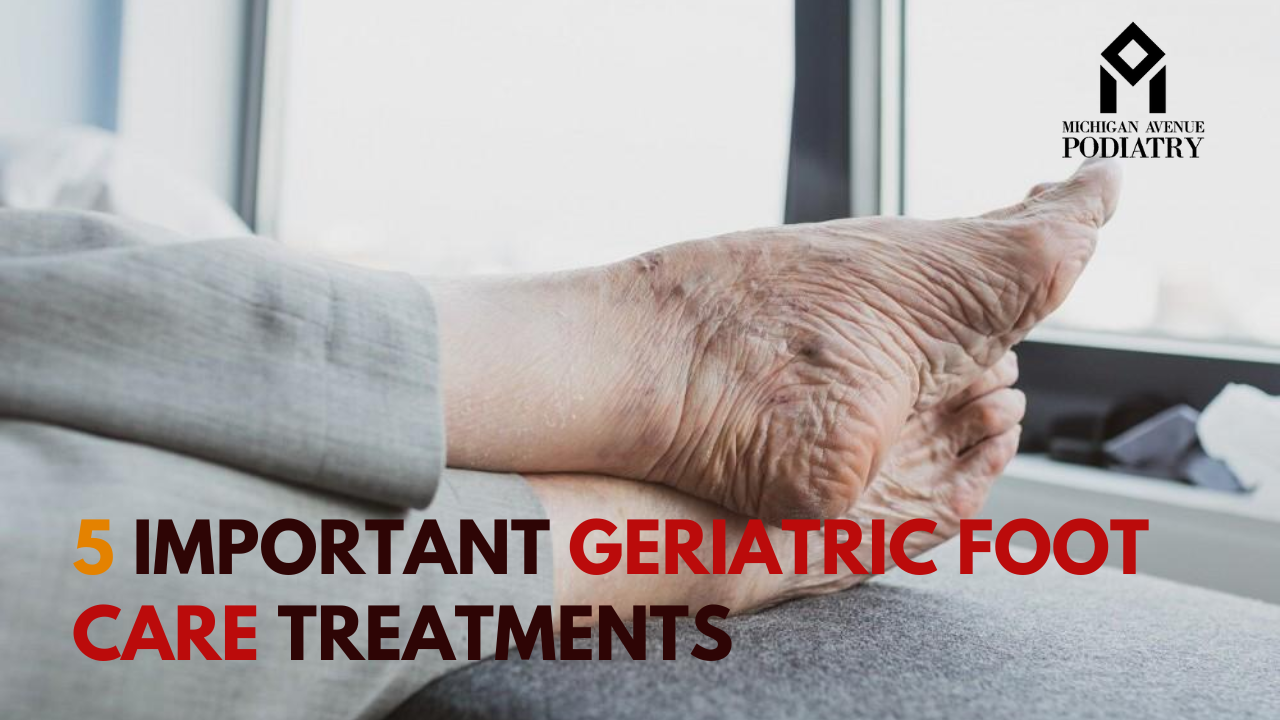As individuals age, their feet undergo significant changes due to factors such as decreased elasticity, reduced circulation, and wear and tear from years of use. Proper foot care becomes increasingly important for older adults to maintain mobility, prevent falls, and manage chronic conditions. In this informative blog post, we’ll explore five essential geriatric foot care treatments recommended by podiatrists to address common issues and promote healthy aging.
- Regular Foot Examinations:
Regular foot examinations are fundamental for identifying early signs of foot problems and preventing complications in older adults. Podiatrists recommend that seniors undergo comprehensive foot evaluations at least once a year, or more frequently if they have existing foot conditions or risk factors such as diabetes. During these examinations, the podiatrist assesses the individual’s foot structure, skin integrity, circulation, and sensation, and checks for any signs of deformities, injuries, or infections. Early detection of foot issues allows for prompt intervention, reducing the risk of serious complications such as foot ulcers or infections, which can lead to mobility issues or amputation in severe cases.
- Custom Orthotic Inserts:
Custom orthotic inserts are specialized shoe inserts designed to provide support, stability, and alignment for the feet, helping alleviate pain and improve foot function. For older adults experiencing foot pain, arthritis, or balance problems, custom orthotics can offer significant relief and enhance mobility. Podiatrists carefully assess the individual’s foot structure, gait pattern, and specific needs to create customized orthotic inserts that address biomechanical abnormalities and provide optimal support. By reducing pressure on vulnerable areas of the foot and promoting proper alignment, custom orthotics can enhance comfort and mobility, allowing seniors to maintain an active and independent lifestyle.
- Diabetic Foot Care Management:
Diabetes poses significant risks for foot health in older adults, increasing the likelihood of neuropathy (nerve damage), poor circulation, foot ulcers, and infections. Proper diabetic foot care management is crucial for preventing complications and preserving foot health. Podiatrists play a vital role in diabetic foot care, providing comprehensive evaluations, preventive measures, and treatment strategies tailored to each individual. This may include regular foot assessments, education on foot hygiene and footwear, management of calluses and corns, and treatment of foot ulcers or infections. By implementing proactive foot care measures and collaborating closely with a podiatrist, seniors with diabetes can reduce the risk of serious foot complications and improve their overall quality of life.
- Wound Care and Ulcer Management:
Older adults are susceptible to foot wounds and ulcers due to factors such as reduced skin elasticity, impaired circulation, and sensory neuropathy. Proper wound care and ulcer management are essential for promoting healing and preventing infection. Podiatrists are trained to assess and treat various types of foot wounds, including pressure ulcers, diabetic foot ulcers, and venous ulcers. Treatment may involve debridement (removal of dead tissue), wound dressing, offloading techniques to relieve pressure, and antibiotic therapy for infected wounds. Additionally, podiatrists educate seniors and their caregivers on proper wound care techniques, prevention strategies, and the importance of regular foot inspections to detect problems early and prevent complications.
- Nail Care and Hygiene:
Maintaining proper nail care and hygiene is crucial for older adults to prevent nail disorders such as ingrown toenails, fungal infections, and nail deformities. Podiatrists recommend seniors to trim their nails regularly, cutting them straight across and avoiding cutting them too short to prevent ingrown toenails. Proper cleaning and drying of the feet, especially between the toes, can help prevent fungal infections and reduce the risk of skin breakdown. Seniors with mobility or vision impairments may benefit from professional nail care services provided by podiatrists or trained foot care specialists.
Conclusion:
Geriatric foot care is paramount for maintaining mobility, preventing complications, and ensuring overall well-being in older adults. By prioritizing regular foot examinations, custom orthotic inserts, diabetic foot care management, wound care and ulcer management, and nail care and hygiene, seniors can enjoy improved foot health and quality of life. Consulting with a podiatrist for personalized evaluation and treatment recommendations is essential for addressing individual foot concerns and promoting healthy aging. With proper foot care and management, older adults can stay active, independent, and comfortable as they age.


